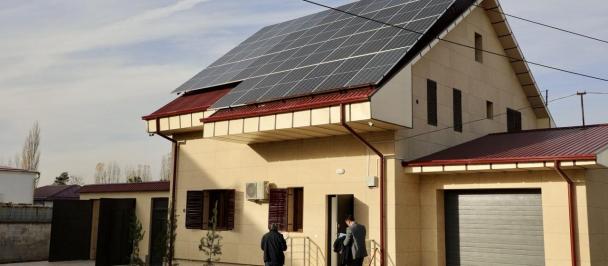Study Tour to Renewable Energy Facilities in Tashkent
June 7, 2022

12th of May, 2022, Tashkent. How the renewable energy sources are utilized at industrial facilities and by the households? What benefits do they bring to their owners and the environment? The answers to these questions have been received by students from the Tashkent universities within the study tour conducted within the project implemented jointly by the United Nations Development Program (UNDP) in Uzbekistan and UK Foreign, Commonwealth and Development Office (FCDO).
In 2019, Uzbekistan adopted the Laws “On Renewable Energy Sources” and “On Public-Private Partnership”, which provided a legal framework for acceleration of implementation of projects aimed at promotion of greater utilization of renewable energy sources. These laws also provide incentives and preferences for producers of renewable energy facilities and for individuals who use renewable energy sources for power generation to supply in their residences. Currently, private power producers can enter into agreements with the power supply companies and sell surplus electricity into the grid. These arrangements encourage households to install PVs and substantially reduce their electricity bills.
During the study tour, students visited a private house, where the owner had installed PV, which is capable not only cover the family's electricity needs, but also sell the surplus to the grid. According to Mr. Rustam Yodgorov, the homeowner, it is quite easy to install PV unit and register it officially. "The rooftop PV installed is , first of all, a contribution to the improvement of the environment. Moreover, it allows me to be independent from the unified energy supply system and sell excess of the generated electrical energy to the national grid," said Rustam Yodgorov.
As Timur Batretdinov, a student from Tashkent State Transport University, stated “The experience of the private households has a great potential for further scaling up not only in the residential areas, but also in the transportation facilities. Currently, the Uzbekistan Railways company is consuming electricity from the grid, but through energy recuperation technology trains are capable to produce electricity as well. Supplying this electricity back to the grid will help the company to contribute to the energy production in Uzbekistan as well as to reduce energy consumption and optimize the costs.”
A visit to the “All Solar” Сompany evoked great interest among students. “All Solar” company presented a range of technological solutions for power generation, hot water supply, heating generation and energy saving thanks to use of solar energy. Solar energy powered units can be placed on the buildings’ roofs and this is an affordable solution for hot water supply and heating.
Further students have visited the Tashkent State University of Technology and familiarized with the generators using solar and wind energy that are installed on the campus. During the presentation students were exposed to the research of the University that focuses on assessment of the efficiency of the units. The power generator uses wind energy was found to have a potential for replication in some areas of Uzbekistan despite the fact that the Uzbekistan is a double landlocked country. Normally, the highest efficiency of the wind turbines is in the coastal areas, where wind is constantly present. However, some areas of Uzbekistan also have sufficient wind speed flows to make wind turbines efficient to generate sufficient power to feed it into the grid.
The study tour was organized within the framework of the regional project ‘Policy action for climate security in Central Asia - Phase II’, implemented by UNDP in cooperation with the Center of Hydrometeorological Services (Uzhydromet) of the Republic of Uzbekistan, and funded by the UK Foreign, Commonwealth and Development Office (FCDO). The project further plans to conduct study tours and interactive climate-related activities for the students to engage them in climate action.

 Locations
Locations


